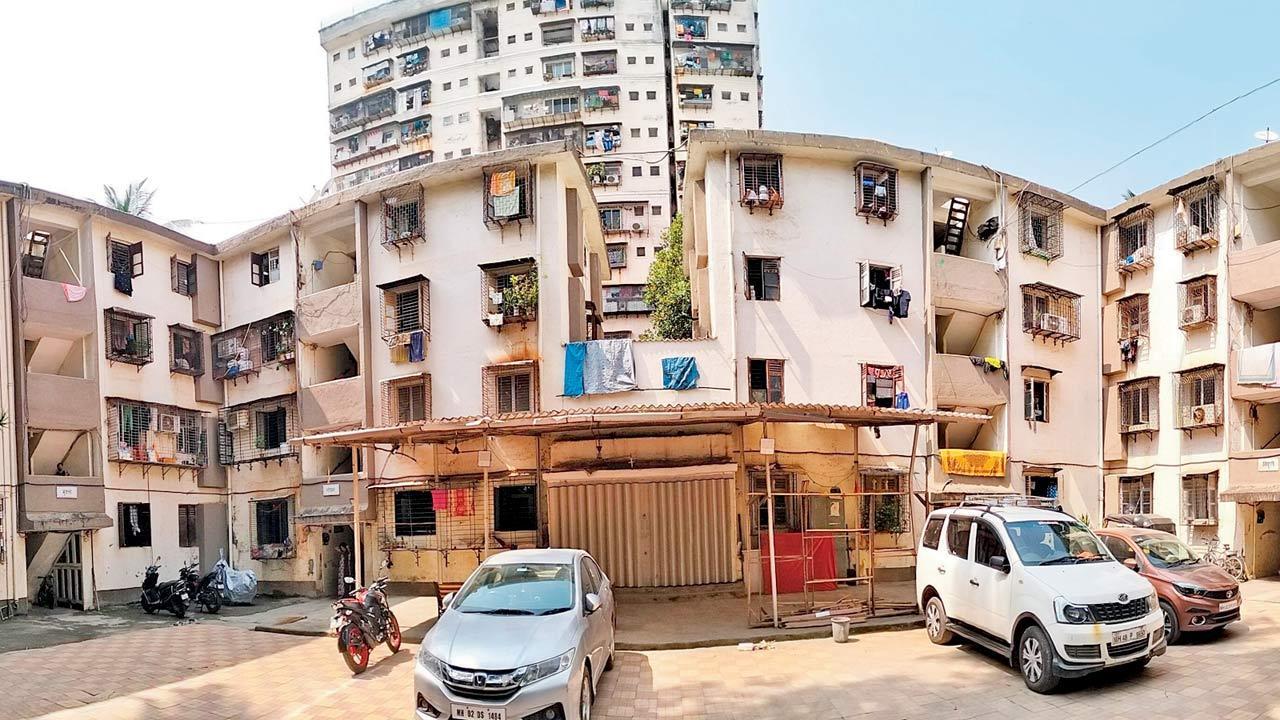Residents secure landmark arbitration win after 16 years of stalled redevelopment

Saidarshan Co-operative Housing Society in Andheri
Not vacating their homes in haste and handing them over to a developer for redevelopment worked in favour of sixty-four flat owners from an Andheri-based cooperative housing society, who last week won a landmark arbitration award.
ADVERTISEMENT
Saidarshan Co-op Housing Society consists of 64 members, each owning a flat measuring 205 sq. ft. carpet area (a one-room kitchen flat with shared washrooms). The building, situated on collector land, was one of the first slum redevelopment projects from 1975 when a handful of members formed the society and constructed a ground-plus-three-floor structure. Over the last 30 years, the building became dilapidated, leading to a development agreement signed on April 28, 2008, with a developer, explained Sudhakar Sawant, chairman of the society.
“For the next 16 years (from 2008), the developer failed to fulfil the suburban collector and BMC building proposal conditions, which delayed the commencement of the redevelopment work. Fortunately, the residents had not vacated their flats, despite the developer’s pressure. Otherwise, like many other stalled projects, we too would have been left without shelter,” explained Suryankant Varankar, 58, the society secretary.
The case
Advocate Shreeprasad Parab, representing the society, said, “Each of the 64 members were entitled to flats in the proposed new building of 360 sqft carpet area (instead of 205 sqft). The developer was to comply with the development agreement terms regarding the purchase of two or more floor space index (FSI), TDR (transferable development rights), IOD (intimation of disapproval) in the name of the society, handover of possession, temporary alternate accommodations, brokerage charges, bank guarantee, etc. They further agreed to complete the construction of the new building within 18 months, with a four-month grace period, from the date of the plinth commencement certificate (PCC).”
Bank accounts frozen
“On March 3, 2010, the developer obtained the IOD with only 0.73 FSI, insufficient even for the 64 rehab flats for existing members. The developer was then required to load TDR and procure additional FSI, obtain NOC from the collector, and commence construction by vacating existing members. The developer breached the development agreement’s terms, and the society decided to terminate the agreement during a special general body Meeting in 2015. Due to the non-payment of the assessment premium to the suburban collector, action was taken against the society by freezing its bank accounts, placing a charge on the society’s property, and restricting third-party transfers of any flats in the society,” said Advocate Parab.
“Promises made in a supplementary agreement on February 16, 2016, were also not kept by the developer, and the society terminated it on October 28, 2018, after attempts by the developer to convince them failed in 2017,” Parab added.
High court Move
The society moved to Bombay High Court in February 2020, just before the COVID-19 lockdown. Two years later, in 2022, the court, after reviewing the case’s merit, appointed an arbitrator for early dispute adjudication. Advocate Parab represented the society, along with Advocate Niranjan Jagtap and Saiprasad Sawant.
Developer’s defence
Advocate Mayur Khandeparkar, representing the developer, argued that the development agreement was transactionally fluid, with both parties altering terms over time (the arbitrator overruled this argument, by concluding that those clauses which were not altered in the Development Agreement stands enforced). He claimed that the society was at fault for not vacating the flats, even after intimation from the developer. It was also argued that the original agreement lacked a termination clause, making the termination invalid.
Khandeparkar highlighted that the developer had already paid a substantial amount to the suburban collector and BMC, demonstrating his intent to begin the project, which was delayed only because the society did not vacate. Consequently, he argued that society should compensate developers for their losses.
Advocate Parab countered, stating that the developer’s claims were merely delaying tactics that left the society in limbo, with no progress on the ground and continuous excuses from the developer for project delays.
The award
The sole arbitrator, Amrut Joshi, after reviewing submissions from both parties, ruled in favour of Saidarshan Co-operative Housing Society. The termination of the development agreement (dated April 28, 2008) and a power of attorney (dated April 30, 2008) by the society was declared legal, valid, and binding on the developer. The developer was ordered to pay a monetary award of Rs 82.40 lakh with 10 per cent interest from the date of arbitration filing in 2022, along with an additional Rs 26 lakh for legal and overhead costs.
Why a win-win for the society
According to Advocate Parab, with the arbitration award in their favour, the society has a free title to the property as it was before 2008, and they are now free to opt for self-redevelopment or appoint a new developer. The society had already spent Rs 60 lakh on repairs due to the building’s poor condition since 2008, along with Rs 26 lakh in legal and other expenses, which the developer is now liable to reimburse.
What’s next
The society is eager to proceed with self-redevelopment and has a word of caution for others: “Do not hand over possession of your flats until the developer has obtained all statutory permissions and has shown proof of adequate funds to complete the project, fulfilling all promises made.”
 Subscribe today by clicking the link and stay updated with the latest news!" Click here!
Subscribe today by clicking the link and stay updated with the latest news!" Click here!







